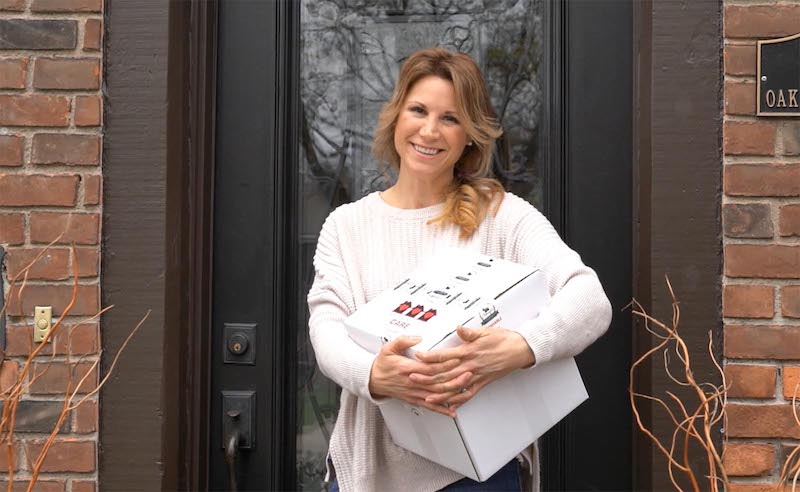
The CDC is now reporting 981,246 cases of COVID-19 and 55,258 deaths in the U.S. In an interview with CNN today, Dr. Anthony Fauci, director of the National Institute of Allergy and Infectious Diseases, said that everybody who needs a test will be able to get one by the end of May or beginning of June. Yet, Fauci continues to urge caution as some states — including Georgia, West Virginia, Texas, and Alabama — begin to reopen. In other news, films not released in theaters can compete in the next Oscars, Uber is cutting 20% of its workforce, and concerns over the U.S. meat supply are growing as meat processing plants shut down due to the coronavirus. Here’s what’s happening in metro Detroit:
The state of Michigan is reporting 1,052 new COVID-19 cases and 160 deaths. Due to a review of old death records, today’s numbers include 40 additional deaths. In total, the state has seen 39,262 cases and 3,567 deaths. []
In his daily press conference, Detroit Mayor Mike Duggan shared that, as of today, 987 Detroiters have died from COVID-19. That means, almost one in 700 residents have died in six weeks from the coronavirus. Yet, data shows that the city’s numbers are declining. There are now 100 empty ICU beds in Detroit hospitals, and only 16 beds are filled at TCF Center. Duggan says the field hospital, able to service nearly 1,000 COVID-19 patients, will not need to stay open much longer. The mayor also discussed plans to bring back 200 of the city’s general services department workers. As employees come back to work, the city will be implementing plans such as daily temperature checks and health screenings, social distancing in the workplace, and mandatory use of masks. Visit the City of Detroit Government Facebook page to watch the entire conference. []
Henry Ford Health System announced today that 14 of its patients have undergone transfusions with convalescent plasma — the type of plasma that’s donated from recovered COVID-19 patients who now have antibodies in their blood — without complications. The first patient to receive an infusion of the plasma was the health system’s Dr. Scott Kaatz, who nearly died from the coronavirus after treating COVID-19 patients during the early days of the pandemic. While patients who underwent transfusions with convalescent plasma are progressively improving, the treatment is still being tested to see if it is effective. “Medicine is built on scientific research: methodical analysis of what works – and what doesn’t,” says Dr. Steven Kalkanis, CEO of Henry Ford Medical Group and senior vice president and chief academic officer for Henry Ford Health System. “While we are cautiously optimistic that this type of treatment could be of some benefit, we won’t know until we are able to analyze data in the future.” [±ŐĚý
Rep. Elisa Slotkin of Michigan’s 8th District held a virtual town hall for kids this morning in which she answered questions about COVID-19. During the live event, she took questions on topics such as reopening schools, COVID-19 vaccinations, and online classes. The town hall, which was filmed using Zoom, can now be viewed on Slotkin’s Facebook page. [±ŐĚýĚý
A group of Pleasant Ridge residents has come together to form Neighbors That Care, an organization that is giving back to local first responders during the pandemic. So far, the group has partnered with the nonprofit Pleasant Ridge Foundation to provide food baskets and aid to the more than 100 first responders who live in Pleasant Ridge. “Whether they work in hospitals or nursing homes, drive ambulances, or keep our streets safe, we want to help these first responders and let them know their neighbors understand that they are putting their lives on the line for us,” says Paul A. Eisenstein, a Neighbors That Care founder. The organization hopes to assist and inspire community groups across the country to set up similar programs, and its website provides resources on how others can get involved. [±ŐĚý
Starting today, the Michigan Department of Natural Resources will begin issuing burn permits again. The department suspended open burning just over a month ago to make firefighters available for emergencies related to COVID-19 and protect first responders. Burning yard debris is the top cause of wildfires in the state. To obtain a permit, visitĚý. []
The Michigan Chamber of Commerce has launchedĚýĚýthat lists manufacturers and vendors who are taking orders for personal protection equipment, such as face masks, hand sanitizer, and face shields. The list is intended to help the state’s businesses as they prepare to reopen. “Governor Whitmer’s executive orders make it mandatory that businesses provide employees with the proper safety equipment to reopen operations,” says Bob Thomas, COO for the Michigan Chamber. “Finding PPE will be the hardest part for small businesses that do not have access to a supply chain.” []
The Food Bank Council of Michigan, a nonprofit made up of regional food banks that serve 83 of the state’s counties, has seen a 41% increase in the distribution of emergency food since March. According to the council, average food distribution before the coronavirus was 439,368 pounds per week, and now it’s at 618,979 pounds. “Everything inside a pandemic like COVID-19 gets magnified and multiplied,” says Dr. Phil Knight, executive director of the Food Bank Council of Michigan. “Inequities are magnified but the efforts of so many to do so much good gets multiplied.” [±ŐĚý
Peter Jacobson, a University of Michigan professor emeritus of health law and policy, believes that the pandemic has exposed the shortcomings of local, state, and the federal government. Jacobson, who is one of the researchers behind the study “The Role of the Legal System in the Flint Water Crisis,” likens the government’s reaction to the coronavirus to its handling of the water disaster in Flint. “Public health and environmental officials have a lot of discretion over when and whether to act,” Jacobson says. “They need to be very careful about using their authority, without waiting too long. It’s the balance that failed in Flint and likely led to the delays we’ve seen in responding to the coronavirus.” To prepare and mitigate these health crises, he suggests government officials develop criteria for notifying the public and examine which agencies have the authority to investigate threats to public health, among other things. [±ŐĚý
The state is stepping up to help Michigander with their student loans during the pandemic. The Michigan Department of Treasury announced today that collection activities on delinquent Federal Family Education Loan Program student loans that are made by a financial institution and serviced by the Michigan Guaranty Agency will be halted until Sept. 30. []
As anxiety and fear are becoming heightened amid the coronavirus pandemic, the Oakland Community Health Network is planning to expand its outreach efforts during Mental Health Awareness Month in May. The organization has organized a calendar with daily social media posts that its service providers and community members — including Common Ground, Oakland Family Services, and Easterseals Michigan — will share. The Oakland County Community Health Network will also run television, Spotify, and cell phone banner ads promoting the message “Hope Starts Here.” “Community connection is so important during these challenging times,” says Nicole Lawson, deputy executive director and COO of the organization. “By uniting our efforts and sharing messages of hope, we can ensure the mental health needs of all Oakland County citizens are met and that no one feels alone.” []
|
| Ěý |
|











